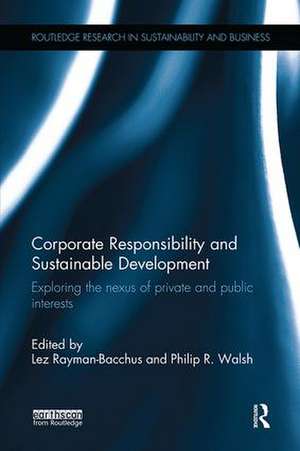Corporate Responsibility and Sustainable Development: Exploring the nexus of private and public interests: Routledge Research in Sustainability and Business
Editat de Lez Rayman-Bacchus, Philip Walshen Limba Engleză Paperback – 16 iun 2017
This book explores the gaps and overlaps between corporate responsibility and sustainable development. These concerns overlap because they implicate corporate practices, state development policy challenges, the concerns and priorities of non-governmental organisations, and the potential for innovative forms of organisation to address these challenges. This collection examines these questions in terms of tensions and interdependencies, between competing claims to resources, rights and responsibilities, strategy and governance, between public and private interest, and the implications for equity and the common good over the long term.
This is a valuable resource for researchers, lecturers, practitioners, postgraduate and final year undergraduates in business strategy, international business and international management, public sector policy and management, international development, political economy. It is also suitable for more specialist courses on sustainability, corporate responsibility, governance and international development.
| Toate formatele și edițiile | Preț | Express |
|---|---|---|
| Paperback (1) | 449.41 lei 6-8 săpt. | |
| Taylor & Francis – 16 iun 2017 | 449.41 lei 6-8 săpt. | |
| Hardback (1) | 1111.72 lei 6-8 săpt. | |
| Taylor & Francis – 24 noi 2015 | 1111.72 lei 6-8 săpt. |
Din seria Routledge Research in Sustainability and Business
-
 Preț: 287.56 lei
Preț: 287.56 lei -
 Preț: 278.88 lei
Preț: 278.88 lei -
 Preț: 357.97 lei
Preț: 357.97 lei -
 Preț: 280.35 lei
Preț: 280.35 lei -
 Preț: 258.73 lei
Preț: 258.73 lei -
 Preț: 301.92 lei
Preț: 301.92 lei -
 Preț: 309.69 lei
Preț: 309.69 lei -
 Preț: 449.41 lei
Preț: 449.41 lei - 18%
 Preț: 1053.16 lei
Preț: 1053.16 lei -
 Preț: 395.90 lei
Preț: 395.90 lei -
 Preț: 410.41 lei
Preț: 410.41 lei -
 Preț: 382.05 lei
Preț: 382.05 lei - 18%
 Preț: 1000.27 lei
Preț: 1000.27 lei -
 Preț: 382.36 lei
Preț: 382.36 lei -
 Preț: 416.22 lei
Preț: 416.22 lei -
 Preț: 467.10 lei
Preț: 467.10 lei - 16%
 Preț: 261.72 lei
Preț: 261.72 lei -
 Preț: 412.86 lei
Preț: 412.86 lei - 18%
 Preț: 1004.41 lei
Preț: 1004.41 lei -
 Preț: 389.66 lei
Preț: 389.66 lei -
 Preț: 393.31 lei
Preț: 393.31 lei - 18%
 Preț: 1000.76 lei
Preț: 1000.76 lei
Preț: 449.41 lei
Nou
Puncte Express: 674
Preț estimativ în valută:
85.99€ • 90.04$ • 71.33£
85.99€ • 90.04$ • 71.33£
Carte tipărită la comandă
Livrare economică 09-23 aprilie
Preluare comenzi: 021 569.72.76
Specificații
ISBN-13: 9781138304208
ISBN-10: 1138304204
Pagini: 248
Dimensiuni: 156 x 234 x 25 mm
Greutate: 0.45 kg
Ediția:1
Editura: Taylor & Francis
Colecția Routledge
Seria Routledge Research in Sustainability and Business
Locul publicării:Oxford, United Kingdom
ISBN-10: 1138304204
Pagini: 248
Dimensiuni: 156 x 234 x 25 mm
Greutate: 0.45 kg
Ediția:1
Editura: Taylor & Francis
Colecția Routledge
Seria Routledge Research in Sustainability and Business
Locul publicării:Oxford, United Kingdom
Public țintă
Postgraduate and UndergraduateCuprins
Introduction Part 1. Challenging Corporate Accountability 1. Corporate Social Responsibility and Corporate Accountability: A Historical Overview 2. Corporate Human Rights Risk: Reconciling Law and Firm Behaviour Part 2. Community Interests and Responsibility 3. A Space of Isolation: entrepreneurship in a time of crisis in Italy 4. Locating Local Community Interests between Government’s Assurances and Investor’s Expectations Part 3. Reconciling Stakeholder Expectations 5. Health and well-being vulnerability of the socio-economically disadvantaged: The role of food 6. Explaining Corporate Social Performance through Multilevel Analysis Part 4. Effecting Sustainable Partnerships 7. A Theory of Public-Private Sustainable Development Partnerships 8. Meta-regulation for Environmental Monitoring and Corporate Sustainability Reporting 9. Timber companies and state building in the Congo Basin Conclusions
Notă biografică
Lez Rayman-Bacchus is Visiting Research Fellow at University of Winchester Business School, UK.
Philip R. Walsh is Associate Professor at Ryerson University, Canada.
Philip R. Walsh is Associate Professor at Ryerson University, Canada.
Descriere
This book explores the gaps and overlaps between corporate social responsibility and sustainable development, two concepts that might reconcile many of the big challenges facing the world: tensions between respect for the natural environment, social justice, and economic development; the long view versus short-term imperatives; the competing priorities between developed and developing economies; the private interests of businesses and the public interests of communities and civil society. These concerns overlap because they implicate corporate practices, state development policy challenges, the concerns and priorities of non-governmental organisations, and the potential for innovative forms of organisation to address these challenges.














